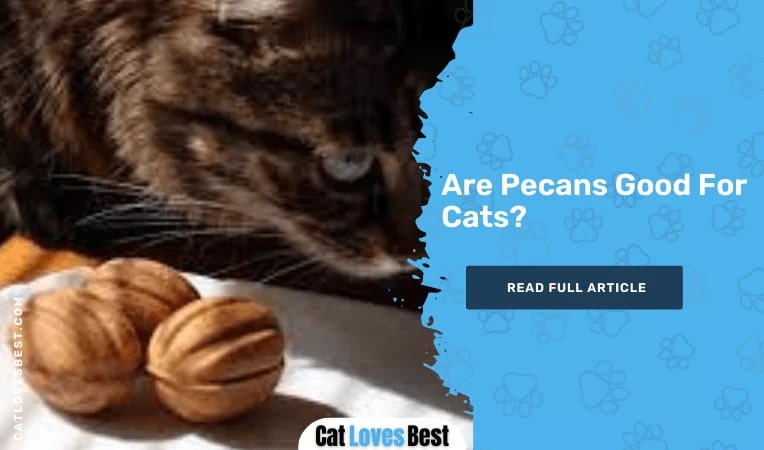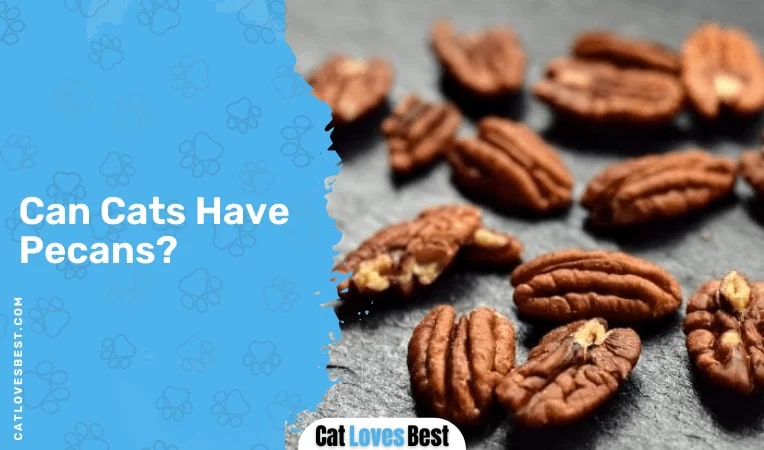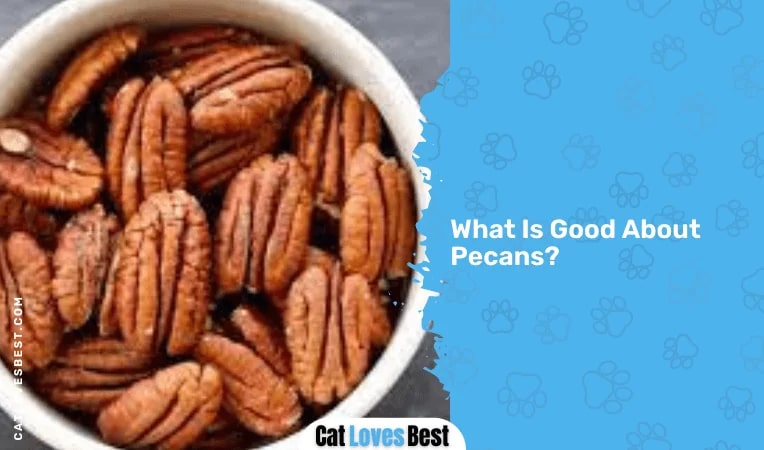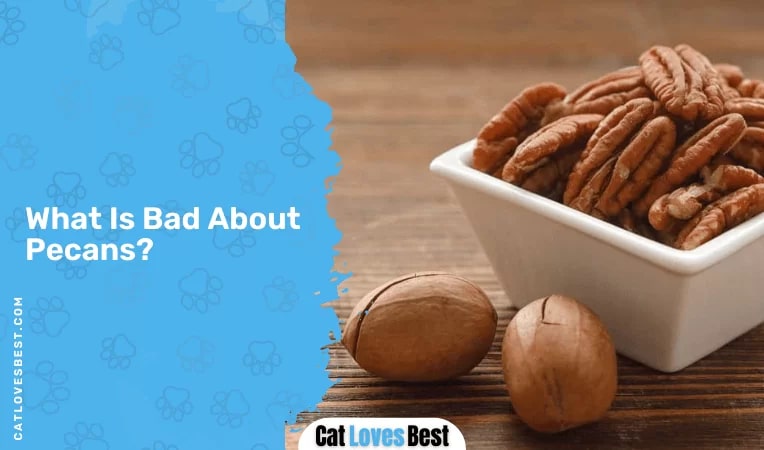Can cats eat pecans? The short answer is yes, they can have pecans, it might not sound like music to your ears! Cats eating pecans, but we all know how cats can jump on weird choices of foods. Well, it contains high fat, so you should always take care of the moderation.
While baking a cake for my evening treat, I discovered my cat was peculiarly staring at the glass jars full of pecans! I knew she wanted it!
But wait, do they need it? Yes, but again in a customized proportion. You just can’t swipe a handful of pecans in their cute paws! Do they contain the same nutritious value for cats?
Well yes, in somewhat manner they do!

Can Cats Have Pecans?
The short answer is yes, cats can eat pecans safely. In fact, pecans are high in omega-3 fatty acids, which are great for providing structure to your cats’ cell membranes and providing energy for their bodies. However, too many pecans can cause vomiting and diarrhea.
There is no infinite number of possibilities on feeding your cat pecans, accidentally or purposely!

In both of the cases, what matters is these walnut-like tasty nuts are edible for cats, only if eaten in a very small portion.
Most of the cats will survive this experiment, but some might get allergies. The pecans are less inclined towards benefits for cats than profit. In case of accident indigestion, she might feel like vomiting or gets diarrhea.
If they are consumed in larger quantities, there are more chances of developing a serious risk.
Less common symptoms such as prompt heftiness and cause pancreatitis or kidney failures are witnessed in outrageous cases.
Ailments like kidney failures and pancreatitis are extreme for felines, as they can not recuperate from it. Particularly on account of older felines, That’s why you should try to take care of the food that might make hurt its well-being.
What Is Good About Pecans?
There are few good qualities about pecans, which is why you’re here, firstly they are cheaper than walnuts, and secondly, they contain more nutritious value.
Storing them in a dry, moisture content of around 4%, reduces moisture as soon as possible after harvesting. Which makes it soft and rubbery.

Eventually, safer for cats than raw pecans.
Pecans are very rich in Omega-3 fatty acids, which can be a good source of protein. We all know how skeptical they can get when it comes to food, if you want them to intake the goodness of pecans, you can surely give them one or two in a week! But by cats, I meant those who are not overweighted!
Now, cats don’t require fibers in their diet, that’s why you won’t catch them munching grass from your backyard!
Against that case, feeding them pecans in moderate amounts might aid as relief from diarrhea, constipation, diabetes, high-fat levels in the blood.
Pet owners with chubby kitties, don’t be sad, this one is for you, giving your cat a moderate amount of pecans can make them feel quite fuller, which will prevent them from overeating. So you might say that this is a diet pecan for your chubby kitten!
What Is Bad About Pecans?
Felines have no negative reaction to consuming pecans, as they are not toxic to cats. But that doesn’t make it suitable for cats, just like humans can eat cat food, but will they? No! As simple as that!

Few things can go wrong with poor cats if you try to feed them on a daily basis. Firstly, pecans are small and can be hard to digest by your cats.
If she just engulfs it without thinking, which she won’t! After all, it’s a cat! It might pose choking, which will transfer her directly to emergency!
That’s why you need to be extra careful about this section.
Pecans belong to the family of nuts, they are cheaper than walnuts, contain a higher degree of fiber and fats.
Our beloved cats might not require any of these if she’s healthy. Specially fibers, which make them feel full all the time. This can hamper her food intake. The same goes with fats, most of the common illnesses cats face is obesity! This is the last thing you want for her to face.
Pecans have a large amount of oil in them, oils mean fats, which can do no good to the health of our cats!
Excessive oil consumption will make it so difficult for her to digest, might show signs of upset stomachs through vomiting, diarrhea, and hotspots. Also develops the high risk of making your cat weighty as it is high in fats.
Are Cats Allergic to Pecans?
Each cat is unique, which indicates that some might or might not develop an allergic reaction to pecans.
If your cats are allergic to pecans, you might find them sneezing, itching of the ears and head, nut allergies can manifest in a variety of ways, but the most common symptoms include rash, vomiting, and itching.
As these symptoms are so similar to that of common cat conditions, ultimately it will be difficult for you to determine the differences.
The only way to spot them would be to look for such conditions which trigger the digestive system. Taking her to the vet would be the safest option!
Most of the felines are immune from such allergies, The easiest technique to check for allergies in your cat is to change his or her diet.
The doctor will most likely recommend switching to a novel protein or hypoallergenic diet because many commercial pet diets include such a wide array of components.
How Much Pecans Is Too Much?
If we state that pecans are safe for your cats that doesn’t mean we are giving you green flags, to balance the battle between green and red flags, you need to know how many pecans is too much! Cats are obligate carnivores, so your feline can hardly digest anything apart from meat.
The safe answer to this question is that even a handful of pecans is too many for cats.
If your cat accidentally indigestion in a larger quantity, then there is a potential need of rushing to the vet. Prompt heftiness, pancreatitis, or kidney failures are observed in extreme cases.
Pecans have a large amount of oil in them, oils mean fats, which do no good to the health of our cats! Excessive oil consumption will make it so difficult for her to digest, will trigger issues like vomiting and diarrhea in them.
Also develops the high risk of making your cat weighty. So the option of how many pecans is too much for cats matters very little.
Now that you know can cats eat pecans, let’s learn can kittens also eat pecans!
Can Kittens Have Pecans?
While pecans are safe for cats if given in the proper proportion, but you can’t say the same for kittens. Majorly because our cute little kittens developed teething at about 10 weeks to 6 months of age, chewing pecans can be a task for them.
You don’t want her to choke on too small-small pecans.
Going through the nutritious value might look like a good idea, but it can grow into something dangerous. So you need to consider other sources for giving her proper nutrition.
Soft pecans can be a much safer option than raw ones!
When, pecans are stored in a dry, with a moisture content of around 4%. Pecan moisture should be reduced as soon as possible after harvesting.
Humidity above these levels can result in kernel deformation, which makes it soft and rubbery. This is the only case where they can be safe for kittens to digest.
Conclusion
Pecans are not toxic for cats! This means that they are excellent for providing structure to your pet’s cell membranes and providing energy for their bodies.
A moderate amount or accident consumption of pecans won’t harm your cat, but you should always look for the possible side effects, as it could be hard for them to digest. They can trigger allergies, diarrhea in extreme cases.
Approved by Veterinary – Anthony Brooks, DVM!
References:
- Konradsen, J. R. (2021). Unusual and Unexpected Allergic Reactions Can Be Unraveled by Molecular Allergy Diagnostics. FullText – International Archives of Allergy and Immunology 2021, Vol. 182, No. 10 – Karger Publishers. https://doi.org/10.1159/000515708
- Evaluating Pecan Problems – Fruit & Nut Resources Fruit & Nut Resources. (n.d.). https://aggie-horticulture.tamu.edu/fruit-nut/fact-sheets/evaluating-pecan-problems/
- Kovalkovičová, N. (2009, September 1). Some food toxic for pets. https://doi.org/10.2478/v10102-009-0012-4

